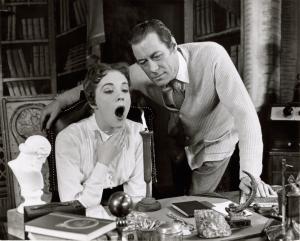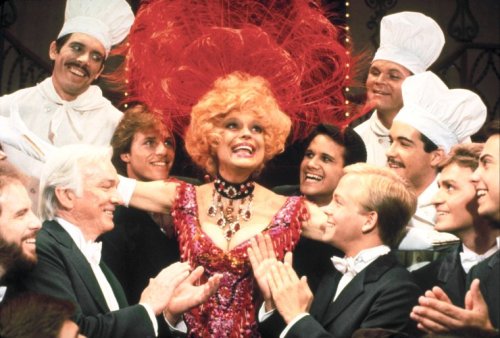The march towards the 2017 Tony Awards continues, and so do my annual predictions! As always, I will be using a combination of personal opinion, critical consensus, and industry buzz to determine the most likely winners, which don't necessarily line up with the most deserving winners. Should the two diverge, I will make sure to point that out in my analysis.
Now that we've tackled the Lead Actors, let's move on to Broadway's leading ladies!
Best Actress in a Play
Nominees: Cate Blanchett, The Present; Jennifer Ehle, Oslo; Sally Field, The Glass Menagerie; Laura Linney, The Little Foxes; Laurie Metcalf, A Doll's House, Part 2
Both Cate Blanchett and Sally Field are the recipients of not one but two Academy Awards each, which will surely ease the sting of not winning the Best Actress in a Play Tony this year. Blanchett's work in The Present was phenomenal, but the play itself proved off-putting to a large segment of the theatre community; combine that with the fact it closed several months ago and Blanchett is an extreme long shot. Sally Field's work in The Glass Menagerie is much more recent, but Sam Gold's divisive, stripped down approach to the Tennessee Williams classic did her no favors, handicapping Field to the point where I can't imagine her winning.
Jennifer Ehle doesn't often perform on Broadway, but when she does she has an excellent Tony track record. Prior to Oslo, Ehle had just three Broadway credits to her name, and two Tony wins to go with them, so counting her out of the race would be foolish. But her remaining two competitors, The Little Foxes' Laura Linney and A Doll's House, Part 2's Laurie Metcalf, are both overdue for Tony glory, as despite multiple nominations neither has ever won. Linney's recent win at the Drama Desk Awards along with the higher level of buzz for Manhattan Theatre Club's starry revival give her the edge, and I expect her name to be called on Sunday night. But one cannot rule out Metcalf, especially considering the high level of love the Tony nominators showed for A Doll's House, Part 2.
Will and Should Win: Laura Linney, The Little Foxes
Both Cate Blanchett and Sally Field are the recipients of not one but two Academy Awards each, which will surely ease the sting of not winning the Best Actress in a Play Tony this year. Blanchett's work in The Present was phenomenal, but the play itself proved off-putting to a large segment of the theatre community; combine that with the fact it closed several months ago and Blanchett is an extreme long shot. Sally Field's work in The Glass Menagerie is much more recent, but Sam Gold's divisive, stripped down approach to the Tennessee Williams classic did her no favors, handicapping Field to the point where I can't imagine her winning.
Jennifer Ehle doesn't often perform on Broadway, but when she does she has an excellent Tony track record. Prior to Oslo, Ehle had just three Broadway credits to her name, and two Tony wins to go with them, so counting her out of the race would be foolish. But her remaining two competitors, The Little Foxes' Laura Linney and A Doll's House, Part 2's Laurie Metcalf, are both overdue for Tony glory, as despite multiple nominations neither has ever won. Linney's recent win at the Drama Desk Awards along with the higher level of buzz for Manhattan Theatre Club's starry revival give her the edge, and I expect her name to be called on Sunday night. But one cannot rule out Metcalf, especially considering the high level of love the Tony nominators showed for A Doll's House, Part 2.
Will and Should Win: Laura Linney, The Little Foxes
Best Actress in a Musical
Nominees: Denee Benton, Natasha, Pierre & The Great Comet of 1812; Christine Ebersole, War Paint; Patti LuPone, War Paint; Bette Midler, Hello, Dolly!; Eva Noblezada, Miss Saigon
Let us stop and take a moment to appreciate the embarrassment of riches that is this year's Best Actress in a Musical category. This season brought us two-time Tony-winners Patti LuPone and Christine Ebersole at the top of their respective games, and yet both seem like long shots to win the award! Either performance would be worth the price of admission to War Paint; the fact that you get both makes it true must see theatre for any musical aficionado, a thrilling night of two titans doing what they do best. Newcomer Eva Noblezada is also sensational in Miss Saigon, a worthy successor to Lea Salonga in the role of Kim and someone I hope we will be seeing much more of in the coming years. (I am less enthralled with The Great Comet's Denee Benton, but am glad to see Broadway continuing to embrace diverse casting options.)
However, this award is destined to go to Bette Midler, whose performance in Hello, Dolly! is truly one for the record books. I have seen quite of bit of theatre in my eight years living in New York, including industry stalwarts like Audra McDonald, Kelli O'Hara, Sutton Foster, Bernadette Peters, and the aforementioned LuPone and Ebersole. And I have *never* seen a star turn quite like Midler's, who exceeds any and all expectations you might have for her to deliver a transcendent, triumphant Dolly Levi that feels every bit as definitive as Carol Channing's. There is no learning the kind of star quality Midler has - you're either born with it, or you aren't - but it is coupled with a supreme talent and precise deployment of her many skills that appears effortless. It may be 50 years since her last Broadway musical (as a replacement in the original production of Fiddler on the Roof), but it was worth the wait, and will be rightly rewarded with every Best Actress award around, including the Tony.
Will and Should Win: Bette Midler, Hello, Dolly!
Special Mention: Glenn Close in Sunset Boulevard, who is ineligible for this year's Tonys (having already won for the same role) but is giving a whole new generation the chance to see her breathtaking Norma Desmond
Agree? Disagree? Let me know in the comments, and keep checking back throughout the week for more Tony coverage from Broadway, Etc. You can catch up on anything you may have missed below:
Nominations React
Best Book and Score
Best Direction and Choreography
Best Featured Actor
Best Featured Actress
Best Actor
Let us stop and take a moment to appreciate the embarrassment of riches that is this year's Best Actress in a Musical category. This season brought us two-time Tony-winners Patti LuPone and Christine Ebersole at the top of their respective games, and yet both seem like long shots to win the award! Either performance would be worth the price of admission to War Paint; the fact that you get both makes it true must see theatre for any musical aficionado, a thrilling night of two titans doing what they do best. Newcomer Eva Noblezada is also sensational in Miss Saigon, a worthy successor to Lea Salonga in the role of Kim and someone I hope we will be seeing much more of in the coming years. (I am less enthralled with The Great Comet's Denee Benton, but am glad to see Broadway continuing to embrace diverse casting options.)
However, this award is destined to go to Bette Midler, whose performance in Hello, Dolly! is truly one for the record books. I have seen quite of bit of theatre in my eight years living in New York, including industry stalwarts like Audra McDonald, Kelli O'Hara, Sutton Foster, Bernadette Peters, and the aforementioned LuPone and Ebersole. And I have *never* seen a star turn quite like Midler's, who exceeds any and all expectations you might have for her to deliver a transcendent, triumphant Dolly Levi that feels every bit as definitive as Carol Channing's. There is no learning the kind of star quality Midler has - you're either born with it, or you aren't - but it is coupled with a supreme talent and precise deployment of her many skills that appears effortless. It may be 50 years since her last Broadway musical (as a replacement in the original production of Fiddler on the Roof), but it was worth the wait, and will be rightly rewarded with every Best Actress award around, including the Tony.
Will and Should Win: Bette Midler, Hello, Dolly!
Special Mention: Glenn Close in Sunset Boulevard, who is ineligible for this year's Tonys (having already won for the same role) but is giving a whole new generation the chance to see her breathtaking Norma Desmond
Agree? Disagree? Let me know in the comments, and keep checking back throughout the week for more Tony coverage from Broadway, Etc. You can catch up on anything you may have missed below:
Nominations React
Best Book and Score
Best Direction and Choreography
Best Featured Actor
Best Featured Actress
Best Actor





